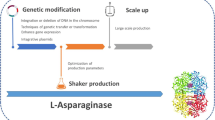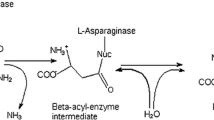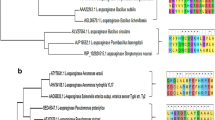Abstract
l-Asparaginases (EC 3.5.1.1) are enzymes that catalyze the hydrolysis of l-asparagine to l-aspartic acid and found in a variety of organisms from microorganisms to mammals. However, they are mainly expressed and produced by microorganisms. Microbial l-asparaginases have received sustained attention due to their irreplaceable role in the therapy of acute lymphoblastic leukemia and for their inhibition of acrylamide formation during food processing. In this article, we review the application of microbial l-asparaginases in medical treatments and acrylamide mitigation. In addition, we describe in detail recent advances in the existing sources, purification, production, properties, molecular modification, and immobilization of l-asparaginase.



Similar content being viewed by others
References
Agarwal A, Kumar S, Veeranki VD (2011) Effect of chemical and physical parameters on the production of l-asparaginase from a newly isolated Serratia marcescens SK-07. Lett Appl Microbiol 52:307–313
Agrawal V, Hee Woo J, Borthakur G, Kantarjian H, Frankel AE (2013) Red blood cell-encapsulated l-asparaginase: potential therapy of patients with asparagine synthetase deficient acute myeloid leukemia. Protein Peptide Lett 20:392–402
Allas S, Sahakian P, Fichtner I, Abribat T (2009) Pharmacokinetics and pharmacodynamics in mice of a pegylated recombinant Erwinia chrysanthemi-derived l-asparaginase. Blood 114:2033
Amena S, Vishalakshi N, Prabhakar M, Dayanand A, Lingappa K (2010) Production, purification and characterization of l-asparaginase from Streptomyces gulbargensis. Braz J Microbiol 41:173–178
Anese M, Quarta B, Frias J (2011a) Modelling the effect of asparaginase in reducing acrylamide formation in biscuits. Food Chem 126:435–440
Anese M, Quarta B, Peloux L, Calligaris S (2011b) Effect of formulation on the capacity of l-asparaginase to minimize acrylamide formation in short dough biscuits. Food Res Int 44:2837–2842
Asselin BL, Ryan D, Frantz CN, Bernal SD, Leavitt P, Sallan SE, Cohen HJ (1989) In vitro and in vivo killing of acute lymphoblastic leukemia cells by l-asparaginase. Cancer Res 49:4363–4368
Babu UK, Ramagopal N, Reddy DSR (2010) Optimization of l-asparaginase production from isolated Aspergillus niger by using solid state fermentation on sesame cake via application of genetic algorithm, and artificial neural network-based design model. J Biotechnol 150:S538–S539
Bansal S, Gnaneswari D, Mishra P, Kundu B (2010) Structural stability and functional analysis of l-asparaginase from Pyrococcus furiosus. Biochemistry-Moscow 75:375–381
Bansal S, Srivastava A, Mukherjee G, Pandey R, Verma AK, Mishra P, Kundu B (2012) Hyperthermophilic asparaginase mutants with enhanced substrate affinity and antineoplastic activity: structural insights on their mechanism of action. FASEB J 26:1161–1171
Basha NS, Rekha R, Komala M, Ruby S (2009) Production of extracellular anti-leukaemic enzyme l-asparaginase from marine actinomycetes by solid-state and submerged fermentation: purification and characterisation. Trop J Pharm Res 8:353–360
Baskar G, Renganathan S (2012) Optimization of l-asparaginase production by Aspergillus terreus MTCC 1782 using response surface methodology and artificial neural network-linked genetic algorithm. Asia-Pac J Chem Eng 7:212–220
Borek D, Jaskólski M (2001) Sequence analysis of enzymes with asparaginase activity. Acta Biochim Pol 48:893–902
Bruneau L, Chapman R, Marsolais F (2006) Co-occurrence of both l-asparaginase subtypes in Arabidopsis: At3g16150 encodes a K+-dependent l-asparaginase. Planta 224:668–679
Cappelletti D, Chiarelli LR, Pasquetto MV, Stivala S, Valentini G, Scotti C (2008) Helicobacter pylori l-asparaginase: a promising chemotherapeutic agent. Biochem Biophys Res Commun 377:1222–1226
Cedar H, Schwartz JH (1967) Localization of the two l-asparaginases in anaerobically grown Escherichia coli. J Biol Chem 242:3753–3755
Cedar H, Schwartz JH (1968) Production of l-asparaginase II by Escherichia coli. J Bacteriol 96:2043–2048
Chohan SM, Rashid N (2013) TK1656, a thermostable l-asparaginase from Thermococcus kodakaraensis, exhibiting highest ever reported enzyme activity. J Biosci Bioeng 116:438–443
Ciesarová Z, Kiss E, Boegl P (2006) Impact of l-asparaginase on acrylamide content in potato products. J Food Nutr Res 45:141–146
Dharmaraj S (2011) Study of l-asparaginase production by Streptomyces noursei MTCC 10469, isolated from marine sponge Callyspongia diffusa. Iranian J Biotechnol 9:102–108
Duval M, Suciu S, Ferster A, Rialland X, Nelken B, Lutz P, Benoit Y, Robert A, Manel A-M, Vilmer E (2002) Comparison of Escherichia coli-asparaginase with Erwinia-asparaginase in the treatment of childhood lymphoid malignancies: results of a randomized european organisation for research and treatment of cancer-children’s leukemia group phase 3 trial. Blood 99:2734–2739
Ebrahiminezhad A, Rasoul-Amini S, Ghasemi Y (2011) l-Asparaginase production by moderate halophilic bacteria isolated from maharloo salt lake. Indian J Microbiol 1:307–311
Ebrahiminezhad A, Rasoul-Amini S, Ghoshoon MB, Ghasemi Y (2014) Chlorella vulgaris, a novel microalgal source for l-asparaginase production. Biocatal Agr Biotechnol 3:214–217
Eisele N, Linke D, Bitzer K, Na’amnieh S, Nimtz M, Berger RG (2011) The first characterized asparaginase from a basidiomycete, Flammulina velutipes. Bioresour Technol 102:3316–3321
Ferrara MA, Severino NMB, Mansure JJ, Martins AS, Oliveira EMM, Siani AC, Pereira N Jr, Torres FAG, Bon EPS (2006) Asparaginase production by a recombinant Pichia pastoris strain harbouring Saccharomyces cerevisiae ASP3 gene. Enz Microb Tech 39:1457–1463
Ferrara MA, Bonomo Severino NM, Valente RH, Perales J, Bon EPS (2010) High-yield extraction of periplasmic asparaginase produced by recombinant Pichia pastoris harbouring the Saccharomyces cerevisiae ASP3 gene. Enz Microb Tech 47:71–76
Ghosh S, Chaganti SR, Prakasham R (2012) Polyaniline nanofiber as a novel immobilization matrix for the anti-leukemia enzyme l-asparaginase. J Mol Catal B-Enzym 74:132–137
Ghosh S, Murthy S, Govindasamy S, Chandrasekaran M (2013) Optimization of l-asparaginase production by Serratia marcescens (NCIM 2919) under solid state fermentation using coconut oil cake. Sustain Chem Process 1:1–8
Gladilina IA, Sokolov NN, Krasotkina IV (2008) Cloning, expression and purification of Helicobater pylori l-asparaginase. Biomed Khim 54:482–486
Hatanaka T, Usuki H, Arima J, Uesugi Y, Yamamoto Y, Kumagai Y, Yamasato A, Mukaihara T (2011) Extracellular production and characterization of two Streptomyces l-asparaginases. Appl Biochem Biotechnol 163:836–844
Hedegaard RV, Frandsen H, Skibsted LH (2008) Kinetics of formation of acrylamide and Schiff base intermediates from asparagine and glucose. Food Chem 108:917–925
Hendriksen HV, Kornbrust BA, Østergaard PR, Stringer MA (2009) Evaluating the potential for enzymatic acrylamide mitigation in a range of food products using an asparaginase from Aspergillus oryzae. J Agric Food Chem 57:4168–4176
Hosamani R, Kaliwal B (2011) Isolation, molecular identification and optimization of fermentation parameters for the production of l-asparaginase, an anticancer agent by Fusarium equiseti. Int J Microbiol Res 3:108–119
Huang L, Liu Y, Sun Y, Yan Q, Jiang Z (2014) Biochemical characterization of a novel l-asparaginase with low glutaminase activity from Rhizomucor miehei and its application in food safety and leukemia treatment. Appl Environ Microb 80:1561–1569
Hüser A, Klöppner U, Röhm KH (1999) Cloning, sequence analysis, and expression of ansB from Pseudomonas fluorescens, encoding periplasmic glutaminase/asparaginase. FEMS Microbiol Lett 178:327–335
Hymavathi M, Sathish T, Rao CS, Prakasham RS (2009) Enhancement of l-asparaginase production by isolated Bacillus circulans (MTCC 8574) using response surface methodology. Appl Biochem Biotechnol 159:191–198
International Agency for Research on Cancer (IARC) (1994) Monographs on the evaluation of carcinogenic risks to humans, some industrial chemicals. Acrylamide. 88:389–433. http://monographs.iarc.fr/ENG/Monographs/vol60/mono60-16.pdf
Jerlström PG, Bezjak DA, Jennings MP, Beacham IR (1989) Structure and expression in Escherichia coli K-12 of the l-asparaginase I-encoding ansA gene and its flanking regions. Gene 78:37–46
Jia M, Xu M, He B, Rao Z (2013) Cloning, expression and characterization of l-asparaginase from a newly isolated Bacillus subtilis B11-06. J Agric Food Chem 61:9428–9434
Kavitha A, Vijayalakshmi M (2012) A study on l-asparaginase of Nocardia levis MK-VL_113. Sci World J 2012:160434
Kenari SLD, Alemzadeh I, Maghsodi V (2011) Production of l-asparaginase from Escherichia coli ATCC 11303: optimization by response surface methodology. Food Bioprod Process 89:315–321
Kornbrust BA, Stringer MA, Lange NEK, Hendriksen HV, Whitehurst R, Oort Mv (2009) Asparaginase—an enzyme for acrylamide reduction in food products. In: Enzymes in Food Technology, 2nd edn. Wiley-Blackwell, UK, pp 59–87
Kotzia GA, Labrou NE (2007) l-Asparaginase from Erwinia chrysanthemi 3937: cloning, expression and characterization. J Biotechnol 127:657–669
Kotzia GA, Labrou NE (2011) Engineering substrate specificity of E. carotovora l-asparaginase for the development of biosensor. J Mol Catal B-Enzym 72:95–101
Kotzia GA, Lappa K, Labrou NE (2007) Tailoring structure-function properties of l-asparaginase: engineering resistance to trypsin cleavage. Biochem J 404:337–343
Kumar NSM, Manonmani HK (2013) Purification, characterization and kinetic properties of extracellular l-asparaginase produced by Cladosporium sp. World J Microbiol Biotechnol 29:577–587
Kumar S, Pakshirajan K, Dasu VV (2009) Development of medium for enhanced production of glutaminase-free l-asparaginase from Pectobacterium carotovorum MTCC 1428. Appl Biochem Biotechnol 84:477–486
Kumar S, Dasu VV, Pakshirajan K (2010) Localization and production of novel l-asparaginase from Pectobacterium carotovorum MTCC 1428. Process Biochem 45:223–229
Kumar S, Dasu VV, Pakshirajan K (2011a) Purification and characterization of glutaminase-free l-asparaginase from Pectobacterium carotovorum MTCC 1428. Bioresour Technol 102:2077–2082
Kumar S, Veeranki VD, Pakshirajan K (2011b) Assessment of physical process conditions for enhanced production of novel glutaminase-free l-asparaginase from Pectobacterium carotovorum MTCC 1428. Appl Biochem Biotechnol 163:327–337
Kumar NSM, Ramasamy R, Manonmani HK (2013) Production and optimization of l-asparaginase from Cladosporium sp. using agricultural residues in solid state fermentation. Ind Crop Prod 43:150–158
Kumar NM, Shimray CA, Indrani D, Manonmani H (2014a) Reduction of acrylamide formation in sweet bread with l-asparaginase treatment. Food Bioprocess Technol 7:741–748
Kumar NSM, Kishore V, Manonmani HK (2014b) Chemical modification of l-asparaginase from Cladosporium sp. for improved activity and thermal stability. Prep Biochem Biotechnol 44:433–450
Kumari PK, Sankar GG, Prabhakar T, Lakshmi SS (2013) Purification and characterization of l-asparaginase from Streptomyces griseoluteus WS3/1. Int J Pharm Sci Rev Res 23:198–202
Li LZ, Xie TH, Li HJ, Qing C, Zhang GM, Sun MS (2007) Enhancing the thermostability of Escherichia coli l-asparaginase II by substitution with pro in predicted hydrogen-bonded turn structures. Enz Microb Tech 41:523–527
Martin JF (1989) Molecular genetics of amino acid-producing Corynebacteria. Symp Soc Gen Microbiol 44:25–59
Mashburn LT, Wriston JC Jr (1964) Tumor inhibitory effect of l-asparaginase from Escherichia coli. Arch Biochem Biophys 105:450–453
Moreno-Enriquez A, Evangelista-Martinez Z, Gonzalez-Mondragon EG, Calderon-Flores A, Arreguin R, Perez-Ruedas E, Huerta-Saquero A (2012) Biochemical characterization of recombinant l-asparaginase (AnsA) from Rhizobium etli, a member of an increasing Rhizobial-type family of l-asparaginases. J Microbiol Biotechnol 22:292–300
Narayana KJP, Kumar KG, Vijayalakshmi M (2008) l-Asparaginase production by Streptomyces albidoflavus. Indian J Microbiol 48:331–336
Narta U, Roy S, Kanwar SS, Azmi W (2011) Improved production of l-asparaginase by Bacillus brevis cultivated in the presence of oxygen-vectors. Bioresour Technol 102:2083–2085
Onishi Y, Yano S, Thongsanit J, Takagi K, Yoshimune K, Wakayama M (2011) Expression in Escherichia coli of a gene encoding type II l-asparaginase from Bacillus subtilis, and characterization of its unique properties. Ann Microbiol 61:517–524
Patil S, Coutsouvelis J, Spencer A (2011) Asparaginase in the management of adult acute lymphoblastic leukaemia: is it used appropriately? Cancer Treat Rev 37:202–207
Pedreschi F, Kaack K, Granby K (2008) The effect of asparaginase on acrylamide formation in French fries. Food Chem 109:386–392
Pedreschi F, Mariotti S, Granby K, Risum J (2011) Acrylamide reduction in potato chips by using commercial asparaginase in combination with conventional blanching. LWT-Food Sci Technol 44:1473–1476
Pieters R, Hunger SP, Boos J, Rizzari C, Silverman L, Baruchel A, Goekbuget N, Schrappe M, Pui CH (2011) l-Asparaginase treatment in acute lymphoblastic leukemia. Cancer 117:238–249
Pokrovskaya M, Pokrovskiy V, Aleksandrova S, Anisimova NY, Andrianov R, Treschalina E, Ponomarev G, Sokolov N (2012a) Recombinant intracellular Rhodospirillum rubrum l-asparaginase with low l-glutaminase activity and antiproliferative effect. Biochemistry-Moscow 6:123–131
Pokrovskaya MV, Aleksandrova SS, Pokrovsky VS, Omeljanjuk NM, Borisova AA, Anisimova NY, Sokolov NN (2012b) Cloning, expression and characterization of the recombinant Yersinia pseudotuberculosis l-asparaginase. Protein Expres Purif 82:150–154
Prakasham RS, Rao CS, Rao RS, Lakshmi GS, Sarma PN (2007) l-Asparaginase production by isolated Staphylococcus sp-6A: design of experiment considering interaction effect for process parameter optimization. J Appl Microbiol 102:1382–1391
Roth G, Nunes J, Rosado L, Bizarro C, Volpato G, Nunes C, Renard G, Basso L, Santos D, Chies J (2013) Recombinant Erwinia carotovora l-asparaginase II production in Escherichia coli fed-batch cultures. Braz J Chem Eng 30:245–256
Sahu MK, Sivakumar K, Poorani E, Thangaradjou T, Kannan L (2007) Studies on l-asparaginase enzyme of actinomycetes isolated from estuarine fishes. J Environ Biol 28:465–474
Sanjeeviroyar A, Rajendran A, Muthuraj M, Basha KM, Thangavelu V (2010) Sequential optimization and kinetic modeling of l-asparaginase production by Pectobacterium carotovorum in submerged fermentation. Asia-Pac J Chem Eng 5:743–755
Savitri AN, Azmi W (2003) Microbial l-asparaginase: a potent antitumour enzyme. Indian J Biotechnol 2:184–194
Shibayama K, Takeuchi H, J-i W, Mori S, Arakawa Y (2011) Biochemical and pathophysiological characterization of Helicobacter pylori asparaginase. Microbiol Immunol 55:408–417
Shrivastava A, Khan AA, Shrivastav A, Jain SK, Singhal PK (2012) Kinetis studies of l-asparaginase from Penicillium digitatum. Prep Biochem Biotechnol 42:574–581
Singh Y, Srivastava S (2012) Statistical and evolutionary optimization for enhanced production of an anti-leukemic enzyme, l-asparaginase, in a protease-deficient Bacillus aryabhattai ITBHU02 isolated from the soil contaminated with hospital waste. Indian J Exp Biol 51:322–335
Singh Y, Srivastava S (2014) Performance improvement of Bacillus aryabhattai ITBHU02 for high-throughput production of a tumor-inhibitory l-asparaginase using a kinetic model based approach. J Chem Technol Biotechnol 89:117–127
Singh Y, Gundampati RK, Jagannadham MV, Srivastava S (2013) Extracellular l-asparaginase from a protease-deficient Bacillus aryabhattai ITBHU02: purification, biochemical characterization, and evaluation of antineoplastic activity in vitro. Appl Biochem Biotechnol 171:1759–1774
Stecher A, Morgantetti de Deus P, Polikarpov I, Abrahao-Neto J (1999) Stability of l-asparaginase: an enzyme used in leukemia treatment. Pharm Acta Helv 74:1–9
Sudhir AP, Dave BR, Trivedi KA, Subramanian RB (2012) Production and amplification of an l-asparaginase gene from actinomycete isolate Streptomyces ABR2. Ann Microbiol 62:1609–1614
Tareke E, Rydberg P, Karlsson P, Eriksson S, Törnqvist M (2002) Analysis of acrylamide, a carcinogen formed in heated foodstuffs. J Agric Food Chem 50:4998–5006
Thenmozhi C, Sankar R, Karuppiah V, Sampathkumar P (2011) l-Asparaginase production by mangrove derived Bacillus cereus MAB5: optimization by response surface methodology. Asian Pac J Trop Med 4:486–491
Verma N, Kumar K, Kaur G, Anand S (2007a) E. coli K-12 asparaginase-based asparagine biosensor for leukemia. Artif Cell Blood Sub 35:449–456
Verma N, Kumar K, Kaur G, Anand S (2007b) l-Asparaginase: a promising chemotherapeutic agent. Crit Rev Biotechnol 27:45–62
Vidya J, Pandey A (2012) Recombinant expression and characterization of l-asparaginase II from a moderately thermotolerant bacterial isolate. Appl Biochem Biotechnol 167:973–980
Vidya J, Vasudevan UM, Soccol CR, Pandey A (2011) Cloning, functional expression and characterization of l-asparaginase II from E. coli MTCC 739. Food Technol Biotechnol 49:286–290
Vidya J, Ushasree MV, Pandey A (2014) Effect of surface charge alteration on stability of l-asparaginase II from Escherichia sp. Enz Microb Tech 56:15–19
Wink PL, Bogdawa HM, Renard G, Chies JM, Basso LA, Santos DS (2010) Comparison between two Erwinia carotovora l-asparaginase II constructions: cloning, heterologous expression, purification, and kinetic characterization. J Microbial Biochem Technol 2:13–19
Yano S, Minato R, Thongsanit J, Tachiki T, Wakayama M (2008) Overexpression of type I l-asparaginase of Bacillus subtilis in Escherichia coli, rapid purification and characterisation of recombinant type I l-asparaginase. Ann Microbiol 58:711–716
Zhang YQ, Xiang RL, Yan HB, Chen XX (2008) Preparation of silk fibroin nanoparticles and their application to immobilization of l-asparaginase. Chem J Chin Univ 29:628–633
Zhang YQ, Wang YJ, Wang HY, Zhu L, Zhou ZZ (2011) Highly efficient processing of silk fibroin nanoparticle-l-asparaginase bioconjugates and their characterization as a drug delivery system. Soft Matter 7:9728–9736
Zhu JH, Liu J (2008) Improving the extraction of intracellular l-asparaginase by high-pressure homogenization. Asia-Pac J Chem Eng 3:211–216
Zhu JH, Yan XL, Chen HJ, Wang ZH (2007) In situ extraction of intracellular l-asparaginase using thermoseparating aqueous two-phase systems. J Chromatogra A 1147:127–134
Zuo S, Xue D, Zhang T, Jiang B, Mu W (2014) Biochemical characterization of an extremely thermostable l-asparaginase from Thermococcus gammatolerans EJ3. J Mol Catal B Enzym 109:122–129
Acknowledgments
This work was supported by the 973 Project (No. 2012CB720802), the 863 Project (No. 2011AA100904), and the Support Project of Jiangsu Province (No. BK20130001) and Shaoxing City (No. 2013A23002).
Author information
Authors and Affiliations
Corresponding author
Rights and permissions
About this article
Cite this article
Zuo, S., Zhang, T., Jiang, B. et al. Recent research progress on microbial l-asparaginases. Appl Microbiol Biotechnol 99, 1069–1079 (2015). https://doi.org/10.1007/s00253-014-6271-9
Received:
Revised:
Accepted:
Published:
Issue Date:
DOI: https://doi.org/10.1007/s00253-014-6271-9




